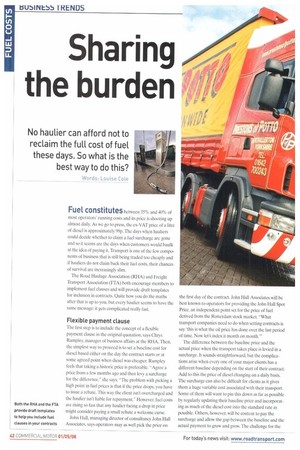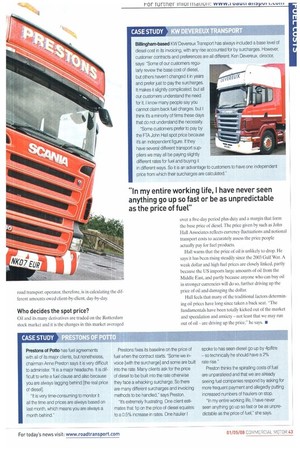Sharing the burden /
Page 42

Page 43

If you've noticed an error in this article please click here to report it so we can fix it.
No haulier can afford not to reclaim the full cost of fuel these days. So what is the best way to do this?
Words: Louise Cole
Fuel constitutes between 35% and 40% of most operators' running costs and its price is shooting up almost daily. As we go to press, the ex-VAT price of a litre of diesel is approximately 99p. The days when hauliers could decide whether to claim a fuel surcharge are gone and so it seems are the days when customers would baulk at the idea of paying it. Transport is one ot' the few components of business that is still being traded too cheaply and if hauliers do not claim back their fuel costs, their chances of survival are increasingly slim.
The Road Haulage Association (RHA) and Freight Transport Association (ETA) both encourage members to implement fuel clauses and will provide draft templates for inclusion in contracts. Quite how you do the maths after that is up to you, but every haulier seems to have the same message: it gets complicated really fast.
Flexible payment clause
The first step is to include the concept of a flexible payment clause in the original quotation, says Chrys Rampley, manager of business affairs at the RHA. Then, the simplest way to proceed is to set a baseline cost for diesel based either on the day the contract starts or at some agreed point when diesel was cheaper. Rampley feels that taking a historic price is preferable. "Agree a price from a few months ago and then levy a surcharge for the difference," she says. —The problem with picking a high point in fuel prices is that if the price drops. you have to issue a rebate. This way the client isn't overcharged and the haulier isn't liable for repayment.However, fuel costs are rising so fast that any haulier facing a drop in price might consider paying a small rebate a welcome curse.
John Hall, managing director of consultancy John Hall Associates, says operators may as well pick the price on the first day of the contract, John Hall Associates will be best known to operators for providing the John Hall Spot Price, an independent point set for the price of fuel derived from the Rotterdam stock market. "What transport companies need to do when setting contracts is say 'this is what the oil price has done over the last period of time. Now let's index it month on month.— The difference between the baseline price and the actual price when the transport takes place is levied in a surcharge. It sounds straightforward, but the complications arise when every one of your major clients has a different baseline depending on the start of their contract. Add to this the price of diesel changing on a daily basis. The surcharge can also be difficult for clients as it gives them a huge variable cost associated with their transport. Some of them will want to pin this down as far as possible by regularly updating their baseline price and incorporating as much of the diesel cost into the standard rate as possible. Others, however, will he content to pay the surcharge and allow the gap between the baseline and the actual payment to grow and grow. The challenge for the road transport operator, therefore, is in calculating the different amounts owed client-by-client, day-by-day.
Who decides the spot price?
Oil and its many derivatives are traded on the Rotterdam stock market and it is the changes in this market averaged over a five-day period plus duty and a margin that form the base price of diesel. The price given by such as John Hall Associates reflects currency fluctuations and notional transport costs to accurately assess the price people actually pay for fuel products.
Hall warns that the price of oil is unlikely to drop. He says it has been rising steadily since the 2003 Gulf War. A weak dollar and high fuel prices are closely linked, partly because the US imports large amounts of oil from the Middle East, and partly because anyone who can buy oil in stronger currencies will do so, further driving up the price of oil and damaging the dollar.
Hall feels that many of the traditional factors determining oil prices have long since taken a back seat. "The fundamentals have been totally kicked out of the market and speculation and anxiety not least that we may run out of oil are driving up the price," he says. •




















































































































































































